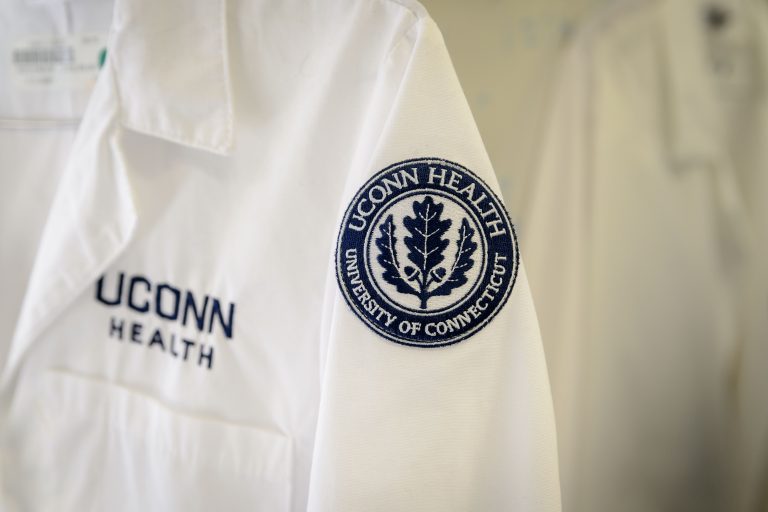Our Research
Established in 1986, the Center on Aging supports a robust, nationally recognized research program focused on preventing or minimizing disability and promoting quality of life in aging adults. Our interdisciplinary and translational research develops a mechanistic understanding of disability, generates and tests innovative interventions, and trains future academic leaders in geriatrics and gerontology. Our research studies seek to develop more precise and individualized ways of maintaining function in late life by preventing mobility problems, fractures, pneumonia, and voiding and memory difficulties.

Our faculty conduct world-class research to improve function and independence in late life, supported by a research portfolio of more than $5 million per scientist. Their research skills include clinical, translational, basic, and health outcomes/population research. This diversity allows the Center on Aging to continually enhance its research activities by monitoring the scientific progress of many relevant research disciplines and translating those discoveries from one discipline (e.g., basic research) to another (e.g., clinical investigation). We also work to translate discoveries made at academic institutions by validating them in “real world” community settings.
Research studies conducted at the UConn Center on Aging are designed to:
- Foster a better understanding of the pathophysiological mechanisms by which inflammatory and endocrine risk factors contribute to frailty and disability.
- Conduct preclinical and clinical trials intended to prevent or delay frailty and disability.
- Better understand how frailty and disability are associated with sociocultural and behavioral factors, as well as healthcare and long-term care service delivery and costs.
Be A Part of Our Healthy Aging Initiatives
To join our mailing list to learn about UConn Center on Aging, Pepper Center events, and research study opportunities, call 860-679-3043, email Lisa Pesce at kenyon-pesce@uchc.edu, fill out the Recruitment Volunteer Registry form, or scan the QR code below:

UConn Claude D. Pepper Older Americans Independence Center Recruitment Volunteer Registry, IRB# 23-134-2.
Active Research Studies at the Center on Aging
Computerized Cognitive Remediation of Long COVID Symptoms in Older Adults
The purpose of the present study is to help address this public health crisis by determining whether computerized "brain-training" treatment has potential for improving thinking, mood, and other aspects of day-to-day functioning in older adults with Long COVID. There are two main aims of the present study. The first aim is to simply determine the "feasibility" of using brain-training treatment in older adults with Long COVID. This includes examining whether Long COVID patients are willing to engage in the treatment and whether they find the treatment acceptable and credible. The second aim is to gather preliminary data on whether the brain-training treatment appears to improve memory, thinking, mood, and other aspects of daily functioning in older adults with Long COVID.
Principal Investigator
Dr. Cutter Lindbergh
Assistant Professor
lindbergh@uchc.edu
Study Coordinator
Holly Eddy, Ph.D., LMFT-S
Clinical Research Assistant
eddy@uchc.edu
Cognitive Remediation of Executive Deficits in Geriatric Depression
The purpose of this study is to test how well depressed older adults are able to complete a computerized program (Neuroflex) designed to improve certain types of “thinking” skills and whether participating in Neuroflex will improve both cognition and mood. This research is being done because usual antidepressants may not be fully effective and/or may be associated with cognitive deficits in many older adults with depression. This leaves them vulnerable to future depressive episodes. The development of new, non-invasive treatments that may help both mood and cognitive symptoms could potentially help older adults with depression.
The study is currently recruiting adults 55 and older who have symptoms of depression and have not been diagnosed with dementia or mild cognitive impairment. To learn more or see if you are eligible to participate, please call Frances Jaynes at 860-679-7948 or email jaynes@uchc.edu.
Principal Investigator
David Steffens, M.D., M.H.S.
Professor and Chair, Department of Psychiatry
steffens@uconn.edu
Study Coordinator
Jennifer Brindisi
Clinical Research Assistant III
brindisi@uchc.edu
Connecticut Housing Engagement and Support Services (CHESS)
CHESS is an initiative of the CT Department of Social Services aimed at supporting CT state residents who have experienced homelessness and chronic health issues. UConn Center on Aging serves as the evaluator of this initiative. As part of the evaluation of CHESS, UConn Center on Aging team members complete baseline, 6-month and 12-month surveys with CHESS enrollees.
Principal Investigators
Julie Robison, Ph.D.
Professor
jrobison@uchc.edu
Study Coordinators
Kate Kellett
Clinical Research Associate
kkellett@uchc.edu
Azucena Minaya
Clinical Research Assistant 2
minaya@uchc.edu
CoreQ Nursing Home Satisfaction Survey
The Connecticut Department of Social Services (DSS) has contracted with the UConn Center on Aging to collect annual satisfaction surveys, called the CoreQ, from residents and family members in every Medicaid-certified nursing home in Connecticut.
Study team members from UConn Center on Aging will annually visit each Medicaid-certified nursing home in the state and administer the CoreQ survey to a sample of eligible nursing home residents. Additionally, a sample of nursing home resident family members or resident representatives will be surveyed.
For questions, please email uconnnursinghomesurvey@uchc.edu.
April 1, 2025 Connecticut Nursing Home CoreQ overview webinar slides.
FAQs about the CoreQ survey administration process.
Principal Investigators
Ellis Dillon, Ph.D.
Assistant Professor
edillon@uchc.edu
Julie Robison, Ph.D.
Professor
jrobison@uchc.edu
Study Coordinators
Sarah Driscoll
Clinical Research Assistant II
sdriscoll@uchc.edu
Deb Migneault
Clinical Research Associate II
demigneault@uchc.edu
Department of Developmental Services: National Core Indicator (NCI) Survey
The UConn Center on Aging study team is contracted with the Connecticut Department of Developmental Services to conduct the annual National Core Indicator Survey. The survey is designed to provide DDS with DDS participants’ feedback on their experiences receiving support from the Department of Developmental Services and living their lives in the community.
For questions, please email dcharles@uchc.edu.
Principal Investigator
Ellis Dillon, Ph.D.
Assistant Professor
edillon@uchc.edu
Study Coordinator
Doreek Charles
Clinical Research Associate
dcharles@uchc.edu
Hematopoietic Epigenetic Memory as a Driver of Inflammation
This new study is designed to help better understand how aging remodels the immune cells in the blood and affects the response to vaccines in older individuals. Participating does not include receiving a vaccination, but rather studying the immune system as we age. Participants who enroll will come for a single study visit where medical history and physical activity questionnaires are done and a blood sample collected. Participants must be between the ages of 20-35 or 65 years old and older. Participant compensation is provided.
Interested in learning more? 860-679-3043.
Principal Investigator
George Kuchel, M.D.
Professor
kuchel@uchc.edu
Study Coordinator
Megan Wing
Clinical Research Assistant
wing@uchc.edu
Increasing Successful Returns to Community Living From Nursing Facilities Through the Money Follows the Person Program
Most people living with dementia (PLWD) prefer to remain at home in the community, yet research shows that they are less likely than people without dementia to successfully return to the community following nursing facility stays. This mixed methods study, funded by the National Institute on Aging, analyzes how different factors are driving disparities for PLWD and what potential policy solutions could improve health equity for PLWD, through in-depth interviews with individuals eligible for the Money Follows the Person (MFP) program and their informal caregivers, focus groups and surveys with professionals involved in the MFP program, and statistical analysis of a large group of Connecticut Medicaid nursing facility residents.
Study team members are interviewing eligible participants and caregivers for one-on-one interviews about returning to the community after a nursing home stay. Study team members are also conducting focus groups and key informant interviews with professionals in the MFP program.
For questions, please email Christine Bailey at cbailey@uchc.edu.
Principal Investigators
Ellis Dillon, Ph.D.
Assistant Professor
edillon@uchc.edu
Julie Robison, Ph.D.
Professor
jrobison@uchc.edu
Study Coordinators
Christine Bailey
Clinical Research Assistant 3
cbailey@uchc.edu
Deb Migneault
Clinical Research Associate
demigneault@uchc.edu
Kate Kellett
Clinical Research Associate
kkellet@uchc.edu
Mito-Frail Trial: Effects of MitoQ on Vasodilation, Mobility and Cognitive Performance in Frail Older Adults
The research is being done to determine whether a antioxidant vitamin called MitoQ improves blood flow, physical health and strength, and mental abilities of older adults.
Call the UConn Center on Aging at 860-679-3043 to learn more.
Principal Investigator
Oh Sung Kwon, Ph.D.
Assistant Professor
ohsung.kwon@uconn.edu
Study Coordinator
Allison Laska
Clinical Research Assistant
alaska@uchc.edu
Mito-LUTS: A Pilot Study of the Effect of MitoQ on Lower Urinary Tract Symptoms in Older Women With Metabolic Syndrome
Lower urinary tract symptoms (LUTS) have a high incidence, with well-documented negative effects on the quality of life of affected individuals. This study will look to see if a supplement, MitoQ, can improve bothersome bladder symptoms (including urgency, frequency, nocturia, and incontinence) that can occur with aging and metabolic syndrome.
Principal Investigator
Iman M. Al-Naggar, Ph.D.
Assistant Professor
alnaggar@uchc.edu
Study Coordinator
Heather McAbee-Sevick, R.N.
Clinical Research Assistant
mcabeesevick@uchc.edu
Money Follows the Person Home and Community Based Services (HCBS) CAHPS Survey
As part of the comprehensive Money Follows the Person program (MFP) quality management strategy, the UConn Center on Aging study team directly interviews participants or their representatives asking about their experiences in the year after transition through the MFP program. MFP consumers are interviewed at 1 month and 12 months post-transition to identify the quality of care and services each consumer experiences over the entirety of their time in the MFP program using the Consumer Assessment of Healthcare Providers and Systems Home and Community-Based Services (HCBS CAHPS®) survey.
Principal Investigator
Julie Robison, Ph.D.
Professor
jrobison@uchc.edu
Study Coordinators
Martha Porter
Clinical Research Associate
porter@uchc.edu
Therence James
Clinical Research Assistant
tjames@uchc.edu
Our Research in the News
Senescent Cells Protect the Bladder
December 18, 2024
Blood test can soon help diagnose Alzheimer’s Disease
August 1, 2024
